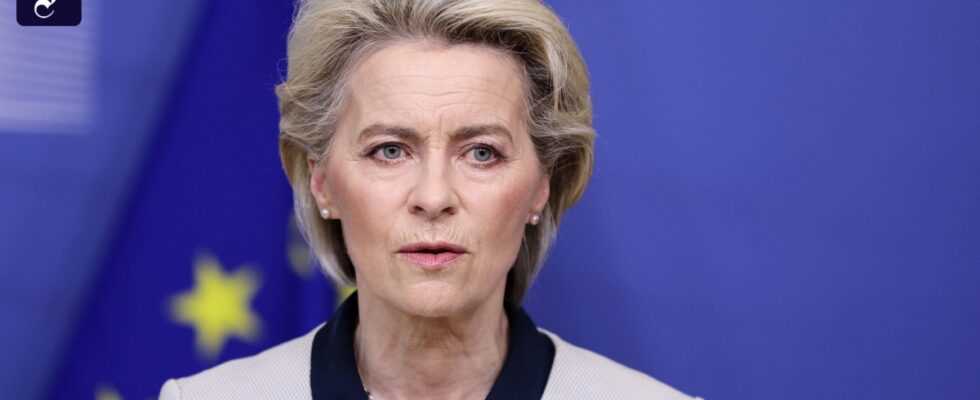EUrsula von der Leyen actually wanted to meet Jens Stoltenberg, the NATO Secretary General, on Thursday morning. That was postponed to the afternoon after both institutions had to go into crisis mode. They were not unprepared, the night before Washington had warned of an imminent attack. Charles Michel, the EU Council President, had already invited the 27 heads of state and government to a special meeting of the European Council on Thursday evening at 8 p.m. It should be about further steps towards Russia and support for Ukraine. Well, in the morning it was clear: the day had come to adopt the “massive and targeted” sanctions against Russia that had been prepared under von der Leyen’s leadership in the past few weeks.
“With this package we will target strategic sectors of the Russian economy by blocking their access to key technologies and markets,” announced the Commission President as she appeared in front of the cameras at half past eight. “We will weaken Russia’s economic base and its ability to modernize.” In addition, Russian assets in the EU will be frozen and Russian banks’ access to the European financial market will “end”. “These sanctions are designed to put a heavy burden on the interests of the Kremlin and its ability to finance the war,” von der Leyen said. An hour later, the EU ambassadors met to clarify final questions about the sanctions package.
Will Swift be completely banned?
It was initially unclear which instruments the EU would use to achieve these goals. The sanctions package was discussed by the heads of state and government in great secrecy, they had to give up their mobile phones. Von der Leyen recently gave the impression with her public statements that a complete exclusion of Russia from the payment service provider Swift was still possible. This is considered the toughest imaginable measure because Russian citizens, companies and the state would then no longer be able to carry out transactions in foreign exchange.
However, Germany and other countries had insisted in internal consultations that payment channels should remain open. Otherwise, Russian debtors would no longer be able to service loans they took out in the West. In addition, energy supplies could no longer be paid for. The question therefore arose as to whether only some banks would be excluded from Swift or whether the EU would resort to more targeted financial market instruments.

Attack on Ukraine
:
The Russian military is coming, the people are fleeing
While these measures should take effect immediately, the planned export restrictions will probably only have an impact in the medium and long term. The EU, in close coordination with America, wants to impose an embargo on high technology in sectors where Europe and America are dominant. American government representatives named artificial intelligence, quantum computers, lasers and sensors, armaments and space travel as examples. Here too, of course, the details will be important, in particular whether China could obtain such technology in a roundabout way.
Some East-Central European states urged that the evening also discuss Ukraine’s prospects of joining the EU. After the presidents of Poland and Lithuania made a joint statement on Wednesday with their Ukrainian counterpart in favor of granting Ukraine candidate status, the heads of government of Poland and Slovenia sent a joint letter to Michel on the same day. In it they called for an “ambitious and tangible plan for the rapid integration of Ukraine into the EU by 2030”. Its first phase should be the “immediate” recognition of Ukraine as a candidate for accession as soon as the country has submitted an application for membership. Then one must define clear steps and timelines, combined with “a guarantee of membership in 2030, provided the necessary conditions are met,” wrote Prime Ministers Mateusz Morawiecki and Janes Jansa.
Michel was anxious to avoid such a debate. One must now keep a cool head, Ukraine needs practical help, not an accession debate, it said on Wednesday. This was, of course, before the start of the Russian attack. Diplomats also pointed out that only countries that have resolved their “neighborhood conflicts” could join the EU. Although this is not formally one of the so-called Copenhagen criteria for EU accession, at a summit meeting in Helsinki in 1999 the heads of state and government called on the countries that were then willing to join – eight Eastern European countries plus Cyprus and Malta – to “do everything possible to resolve any unresolved to resolve border disputes and other related issues”.
This referred in particular to the divided Cyprus, whose accession was finally approved subject to a prior referendum on a Cypriot federation. Before joining in 2013, Croatia also had to commit to settling the territorial dispute with Slovenia over the Bay of Piran. Morawiecki and Jansa are apparently alluding to this when they write that the EU has shown before that such “hurdles” can be overcome.
